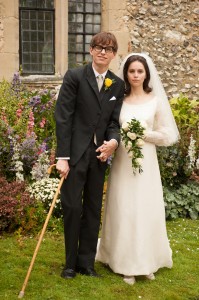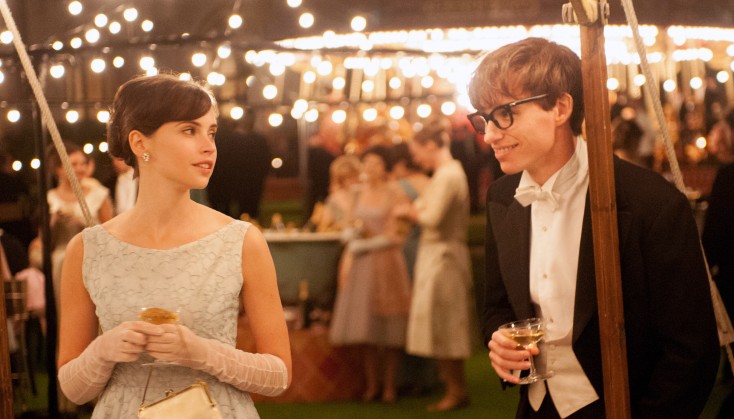
(L to R) Eddie Redmayne stars as Stephen Hawking and Felicity Jones stars as Jane Wilde in Academy Award winner James Marsh’s THE THEORY OF EVERYTHING. ©Focus Features. CR: Liam Daniel.
By ANGELA DAWSON
Front Row Features
HOLLYWOOD—British actress Felicity Jones sees something remarkable about the woman-behind-the-genius roles she has played in “The Invisible Woman” and now “The Theory of Everything.”
“What I like about them is that they are still incredibly powerful people, but their power is shown in a different way,” says the brunette beauty with a lilting accent. “I am quite interested in these women’s stories of how they managed to have power in times when they weren’t ostensibly allowed to have power.”
In the former, she played a Nelly Ternan, the young muse to famed author Charles Dickens. In the latter, she plays Jane Hawking, an author and teacher, as well as the sturdy first wife of the celebrated theoretical physicist Stephen Hawking, who was married to him for more than 25 years.
Dressed in a powder blue cocktail dress, her brown hair pulled back in a chignon, Jones is the epitome of the English Rose. But like Jane, and other quiet yet strong characters she plays in films, her delicate exterior belies a forceful, determined interior.
Born in working-class Birmingham, Jones is the daughter of a journalist and an advertising executive. Though her parents divorced when she was young, her family remained close. She was drawn at an early age to theater and spent the equivalent of senior year of high school touring Japan with a drama troupe.
Though most of her film credits are in independent cinema, she recently played Felicia Hardy in “The Amazing Spider-Man 2.” She is supposed to reprise the role of Felicia a.k.a. Black Cat in a future installment of the popular Marvel superhero series.
In the meantime, Jones explains that she was pleased and honored to take on the role of Jane Hawking opposite her good friend Eddie Redmayne, who plays the renowned theoretical physicist, and welcomed the challenges and advantages of playing someone who is alive. The experience became slightly surreal for the actress when she started getting texts from the former Mrs. Hawking, addressing her as “Jane.”[private]
Q: How was it when you met Jane and what did you get from her that you didn’t get either in the script or from her memoir about her life with Hawking?
Jones: I was nervous meeting Jane because she is formidable. Just reading her book (“Travelling to Infinity: My Life With Stephen”) and the detail with which she writes—I saw that she has an academic mind. She writes of precise dates, times, everything, so I got from the book a strong sense of her interior life.
What I found in meeting Jane is that there is something a bit like the army general about her. That was really useful in playing the scene when Jane is talking to Stephen’s father and she says, “I may not look like a terribly strong person but…” I kept coming back to that scene. It was one of those scenes that I didn’t feel like I got it instantly; it took a bit of time. I thought this is like a woman’s call to arms like she is going into battle— the battle to keep Stephen alive. That’s what I found when I met Jane.
She manages to command a room but in this very sort of polite way and with a very light touch. Her voice is very particular, and to get that right I worked with a dialect coach. I also observed the way she moves. She loves dancing. So I worked with performance coaches to get that right. It was a full-on attack on a character and just trying to know everything I could about them.
Q: Did you meet Stephen Hawking and the other people portrayed in the film?
Jones: Yes, it was all about building trust between everyone. Because the film had come from Jane’s book, Anthony (McCarten, the screenwriter) had spent eight years convincing Jane to make the film. He had read her book and thought it was an incredible way of understanding this relationship. So Jane was already very much onboard and it was very important to her that she had Stephen’s blessing to do the film.
So we went to meet all of them and spend time with Stephen who is phenomenal. He is also very commanding and has an incredible wit and a presence, and I love that there is almost this antagonism between them. They both are very similar personalities. That, in many ways, is what kept their relationship going for so many years because they were always challenging each other.
Q: Once you met the real Jane—aside from the little nuances you picked up— how did that affect your mindset? When you started playing Jane, she was someone you actually knew and perhaps had affection for. Is that a weird thing to navigate?
Jones: Yeah, especially when the real Jane is writing texts that start, “Hi Jane.” (She laughs.) It all gets quite surreal, without a doubt. It was a very unusual project in that sense. That’s why it is something you put your heart into because it has that real dimension to it. These are real people so you want to get it right. The only way I knew how to approach that was to do my homework and prepare and not do anything lightly and not underestimate Stephen or Jane. They’re both formidable.
Q: How was it when Stephen and Jane came to set? Did that put extra pressure on you or did you pretend they weren’t there?
Jones: I felt like the pressure was on from the very beginning so it was more like accumulative pressure. There was nothing oppressive about them coming to set. They live in Cambridge in the world of academia so the film world is completely foreign to them and is one that they were intrigued by, so it never felt like they were going to be judging us. I felt nervous, but by that time I felt like they were fully onboard with the film. It is a little bit surreal, though. I think it was the third day of shooting and I could see Stephen out of the corner of one eye and then Jane out the corner of the other. That was quite strange. Jane was one of the supporting artists in the (outdoor gala) scene. There was one point where (Jane Hawking) rushed up to Eddie and sort of redid his hair, and was like, “Stephen’s hair was not like that!” So they sort of restyled it. We just went with it. I like the hands-on approach.
Q: Speaking of Eddie, did you know before this?
Jones: Yes. We’ve had very similar careers, actually, and we’ve known each other since our early 20s. We’ve gone to auditions together and been turned down for a lot of stuff together and done independent films. We both did theater. Actually, that was such a key element of doing “Theory of Everything,” bringing the elements we’d learned in the theater into preparing for “Theory Of Everything.”
Q: What did you think of Stephen Hawking before this film and what were the surprises you learned about him, while researching the role and meeting him?
Jones: He’s such a universally known figure and he’s a famous celebrity so you feel like you know him but you don’t actually know him at all. And then what I found in meeting him the whole way along is Stephen is someone who is straightforward. You feel that when you meet him. You’re nervously trying to talk and fill silences and make him like you, and he’s someone who just takes hold of the situation and you feel like he sees through things very quickly. I admire that in him. He’s a physicist, but he’s also a philosopher, isn’t he? He said recently when somebody asked him, “What is the best way to get through life?” And the thing he said was, “Be curious.” That’s what he has never given up on. He’s someone who just keeps pushing and trying and analyzing, and you can’t help but take that away with you. That’s such the right curiosity and that’s what you have to maintain.
Q: Between “Theory of Everything” and “The Invisible Woman,” you’ve explored women who inspired and fostered genius men. Has that made you examine your own passion for your craft with those closest to you?
Jones: Yes, in some ways. What was interesting about both of those films is that the women don’t necessarily have the celebrated genius. So with Nelly Turnan (from “Invisible Woman”), you ask yourself, “How does she assert her authority when she is in a situation where she’s not supposed to have any?” With Jane in the ‘50’s and ‘60’s, she wanted to be an academic taken seriously. So how does she navigate her own sense of identity whilst at the same time being a mother, a wife and a caregiver? Like anyone, getting that balance correct is really important to me, and how you achieve that between your personal life and your working life. [/private]





